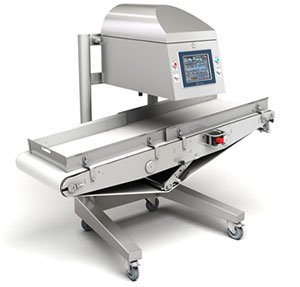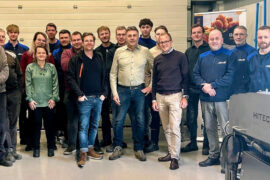A visit to TOMRA Sorting Solutions Stand F010 in Hall 10.1 at Anuga FoodTec could pay dividends for food processors looking to drive up efficiency and production on their lines. A trio of machines from the company will be on display at the show in Cologne, Germany, March 24-27, where its team will be available to answer questions and discuss processors’ specific sorting requirements.
TOMRA Sorting Food will be using its QVision analyzer, the new and improved Halo, and Nimbus sorter to show processors how they can maximize yields and run efficient operations at the same time.
Steve Raskin, sales director for Europe, Middle East and Africa, said: “Pressure on resources combined with a rapidly increasing global population means food security is a serious concern for the supply chain. But food processors do not have to sacrifice yield for sustainability and efficiency. The sorting solutions developed by TOMRA have been designed to help processors optimize their production lines in order to reduce waste and maximize yield.”
 The QVision analyzer is suitable for both frozen and fresh meat and able to simultaneously measure fat, moisture, protein and collagen content inline of up to 30 tons per hour. This, along with the consistent end product quality and savings generated through reduced lean giveaway, helps customers maximize profits from their raw materials.
The QVision analyzer is suitable for both frozen and fresh meat and able to simultaneously measure fat, moisture, protein and collagen content inline of up to 30 tons per hour. This, along with the consistent end product quality and savings generated through reduced lean giveaway, helps customers maximize profits from their raw materials.
The Nimbus free fall sorter will also be on display at Anuga. Suitable for a wide range of applications, including IQF fruits and vegetables, the machine ensures a highly accurate sort to remove unwanted discolorations, foreign material and off-spec products.
The Nimbus’ multiple laser and high-resolution camera system enables sorting by color, structure, size, shape and biological characteristics in free-fall.
The Nimbus Smart Sort module allows the machine to be used to its fullest capabilities and ensures sorting performance occurs at the optimum level, resulting in increased efficiency, yield and quality of the end product. Advanced artificial intelligence makes the machine self-learning and defines good products and defects. Furthermore the sorting machine automatically selects the best sorting parameters for creating a higher level of contrast, resulting in a lower false reject and the highest possible efficiency. To optimize the sorting performance even further, product-specific defects can be self-taught.
Another technology extension to the Nimbus is the state-of-the-art Biometric Signature Identification (BSI) module. It works by detecting the biometric characteristics of objects it scans and comparing them to features in its stored database, to determine whether they should be accepted or rejected.
The BSI module detects even smaller biological defects compared to conventional spectral technology and means the Nimbus is especially adept pre-sorting as well as effective re-sorting or reverse sorting. A pre-sort can reduce the incoming defect load without discarding good product. This can be very cost effective, since product handling and storage all costs money.
For superior performance, many fruit, potato and vegetable processors have opted for the Halo sensor-based optical sorter. The advanced Halo sorting system views and analyzes visible attributes such as color, shape, blemish and foreign material, as well as ‘invisible’ defects to the product composition.
Processors benefit from low operational costs, 80% labor reduction, an increased throughput of 25%, and yield increases that can reach up to four per cent.
The Halo will be fitted out with a new user interface and several other new features and improvements.





